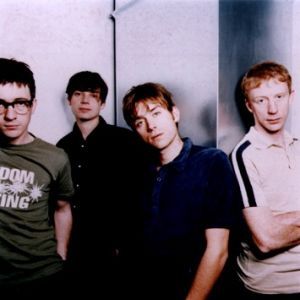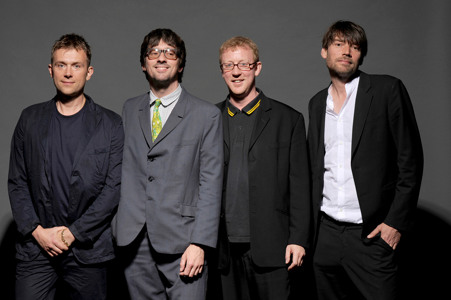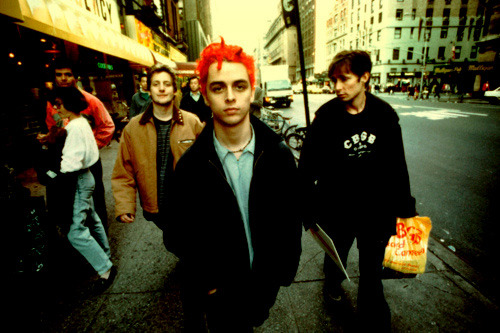 Sound Familiar?
Sound Familiar? “Cut Your Hair,” “Range Life,” “Stereo”
Who Are They?
Those ‘90s indie darlings that only the cool kids listen to.
Once upon a time in California, S.M. and Spiral Stairs (a.k.a. Stephen Malkmus and Scott Kannberg) got together to record some EPs. Drummer and occasional hippie Gary Young (who owned the studio where the EPs were recorded) was fairly impressed with their work, saying, “This Malkmus idiot is a complete songwriting genius.”
Around 1992, Pavement became a full-time band. Mark Ibold (one of the band’s earliest fans) joined on bass and Bob Nastanovich helped Gary out on drums. The band’s debut, Slanted and Enchanted, dropped the same year.
During the tour supporting the album, however, Gary started doing some peculiar (okay, batshit crazy) things. He handed out cabbage and mashed potatoes to fans, did handstands, drunkenly fell off his drum stool, and ran around onstage like a 2-year-old on amphetamines. By 1993, Stephen and company had enough. Gary agreed to leave the band and was replaced by Steve West.
After ditching Gary, Pavement released Crooked Rain, Crooked Rain in 1994. The single “Cut Your Hair” was their closest brush with the mainstream, earning them airtime on MTV and alternative rock radio. Critics loved it, though music connoisseurs Beavis and Butthead termed it “buttwipe music.”
The album also stirred up a little controversy with the single “Range Life.” The lyrics (which Stephen has insisted are meant to be light-hearted) take a couple playful jabs at bands like Smashing Pumpkins and Stone Temple Pilots. (“On tour with the Smashing Pumpkins…I don’t understand what they mean / And I could really give a fuck / The Stone Temple Pilots, they’re elegant bachelors / They’re foxy to me, are they foxy to you? / I agree they deserve absolutely nothing.”)
STP didn’t really care about the mention, but Billy Corgan flipped a shit, going as far as refusing to play the 1994 Lollapalooza Festival if Pavement was also on the bill. (This beef still continues today, by the way. I love you, Billy, but you really need to let it go, man.)
Crooked Rain’s follow-up, 1995’s Wowee Zowee, ended up being a mishmash of punk, country, and ballads, often avoiding conventional song structures. In an interview, Stephen attributed his odd choice of singles to his pot smoking habit, saying, “I was smoking a lot of grass back then, but to me they sounded like hits.” Well played, sir.
During the tour, the boys opted not to work out a setlist. Instead, they played a couple hits, then went into drug-and-alcohol-fueled jam mode. That really didn’t fly with audiences, though. During shows at Lollapalooza, our heroes were pelted with mud and rocks and were forced to leave the stage immediately. Because of this hostile reaction, they dubbed themselves “The Band That Ruined Lollapalooza.”
By the time Brighten the Corners was released in 1997, Pavement was beginning to fragment. Though it sold better than its predecessors, the band decided that the next album (1999’s Terror Twilight) would be the last. Stephen wrote the entirety of Terror Twilight with only minor contributions from the rest of the band. (This was mostly due to producer Nigel Godrich’s favoritism with Stephen.)
After a particularly stressful tour (during which time relationships between members began to fray) and a disastrous appearance at the 1999 Coachella Festival (where Stephen refused to sing), Pavement called it quits.

Where Are They Now?
On good terms, at least.
Speculation about the possibility of a Pavement reunion circled for years after the breakup. Scott Kannberg told Pitchfork that a 2009 reunion was possible back in 2006. Once 2009 rolled around, Brooklyn Vegan reported that Pavement were scheduled to perform multiple benefit show dates in Central Park in 2010. The band confirmed the news, but firmly stated that a permanent reunion was not in the cards.
Pavement ending up doing a world tour, making festival stops at All Tomorrow’s Parties, Coachella, Sasquatch!, and Pitchfork. In September 2010, Stephen and the boys made appearances on The Colbert Report and Late Night With Jimmy Fallon.
After the tour wrapped up, fans and critics awaited the announcement of a new album/permanent reunion.
But it didn’t come.
Bob Nastanovich basically told Spin that Stephen wouldn’t write any more Pavement songs, so the band couldn’t continue.
But Why Pavement?
Why, indeed? Well, it was a pretty big deal for these guys to reunite, even for a short amount of time. I’m sure we’ll see more of them, just not as Pavement.
What Does Sam Think?
While I do preach about grunge, pop-punk, and riot grrrl (to an extent), I have to give huge props to the indie scene in the ‘90s. Thinking back to my previous entry on Blur, we wouldn’t have some of the super rad lo-fi hits like “Song 2” without bands like Pavement.
Oddly enough, that nostalgic indie sound has made a comeback in recent years with bands like Yuck. (Though that sound is a little tame compared to Pavement.)
What makes Pavement special (and not in that elementary school “everyone is special” kind of way) is their dedication to the indie scene. They never signed to a major label, but still managed to make it to MTV. They’ve got a significant cult following (the majority of which is made up of the entire Pitchfork staff) and are considered one of the most influential bands to emerge from the American underground in the ‘90s. Not bad, not bad.
While Pitchfork does build them up to be this hugely talented, unstoppable force (I’m sure the staff has rolled up magazines under their mattresses with Stephen Malkmus on the cover in place of the usual Playboy), I don’t think Pavement lets the praise go to their heads. Do I think they deserve the recognition they get from various publications? Of course. But I don’t think they’re the greatest band on the planet, much less the greatest band of the ‘90s (though they are up there with Nirvana and others).
But let’s not look at the big picture here. I’m not going to compare Pavement to other bands because I don’t think it’s possible to compare them to other bands. If anything, they kind of remind me of the bastard sons of the Pixies, though they were heavily influenced by The Replacements.
That definitive ‘90s sound that most bands of the decade seem to have is perfectly executed with Pavement. It’s noisy and snarky, and most definitely embodies the meaning of “alternative.” While grunge started underground and bubbled up into the mainstream, it eventually turned into a parody of itself. The best thing for an underground band to do (and I may sound like a music snob when I say this) is to stay underground. Pavement retained that indie purity, even into their later years.
Refusing a permanent reunion was also a good move. While Pavement is probably capable of churning out another great album, it’s best for them to quite while they’re ahead, lest they end up sounding like a sad attempt at recreating the good ol’ days.
For now, aspiring indie bands of today can study Pavement’s discography and learn a thing or two. Who knows? Maybe we’ll see another incarnation of Pavement in the near future.
-- Sam Boyer, reporting from the ‘90s.








